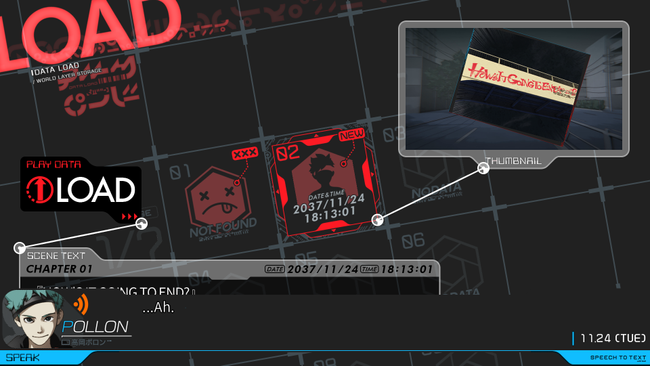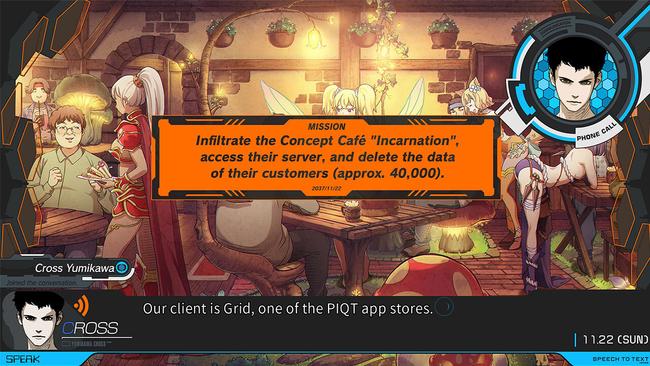
Anonymous;Code Review
The ever-growing number of "SciADV" visual novels take themes of science fiction & technology to tell wonderful — if sometimes bizarre — stories that I can't help but be captivated by. Steins;Gate saw Okabe travel through time to undo the consequences of his actions to save a loved one, while Robotics;Notes presented a story about an after-school robotics club that somehow ended up saving the world.
In Anonymous;Code, a similar sort of flavor resonates throughout. This time, however, the level of suspense is cranked up to astronomical levels. There are so many different thematic concepts here: the occult, time travel, parallel worlds, superpowers, and artificial intelligence, to name a handful. In fact, sometimes it can feel overwhelming. However, Anonymous;Code’s great pacing and characters help to keep things feeling manageable. With its gripping narrative, this has become my favorite SciADV game since the exemplary Steins;Gate. I feel that the narrative scope eclipses Robotics;Notes’, but also was told more coherently than Chaos;Child’s.

Anonymous;Code follows Pollon Takaoka, a hacker in a group called the Nakano Symphonies. He soon meets Momo Aizaki, a young girl who warns him about an impending apocalypse. Together, they team up to investigate and figure out how to avert it. Along the way, they encounter a mysterious entity named Cicada 3301, who sets up seemingly impossible “quests” for them to solve.
These sorts of quests are what make up a majority of the game’s story, and what makes them so enticing is how immediately intense the stakes are. The very first one involves Pollon trying to figure out how to stop a plane from crashing, preventing a terrorist situation. As Pollon and his crew solve more of these Quests, he'll learn more about the true nature of the world, Momo's mysterious origins, and the source of his special powers. The Quests test Pollon's resolve and the limits of his abilities, which all culminate in an emotional journey.
Pollon's powers, as it were, is the ability to Save and Load certain points in time — similar to that of a video game — which acts like a pseudo-time travel mechanic. While Anonymous;Code is a relatively linear visual novel, the Save and Load mechanics are the crux of its gameplay. Basically, when Pollon is in a tight spot, he can reload to a different point in time, effectively traveling backward in time to find a solution.

It’s a unique gameplay system that’s new to the SciADV series, and it complements nicely with the game’s eventual plot twists. He can essentially play God, but what will happen if he suddenly finds himself without the powers? They also provide a mechanism for his character growth, as he has to deal with the consequences that continually reloading takes on his physical and mental state.
The main issue that arises with this mechanic, however, is that it's a little confusing to use at first. See, there’s a difference between *you* as the player, saving and loading your own files, and Pollon doing so with his. He can “create” his own save files to load up throughout the game on a separate menu from yours. Advancing the story involves you pressing the “Hacking Trigger” button at key moments to show the load screen in front of Pollon. This will encourage him to load up one of his saves — loading up your own save points does absolutely nothing to move the narrative. It is sometimes unclear how you precisely need to use this mechanic to progress the story forward.
As a result, I had to consult an existing guide because I was hitting a roadblock as some specific scenarios all of a sudden seemed to break established “rules" of the save/load mechanic. While I was frustrated at that moment, I eventually came around to it because breaking that rule ended up being paramount to the themes of the story. These mechanics take a bit of time to fully grasp, but once you understand when and how to reload, the game’s pacing feels much less disruptive.

The presentation in Anonymous;Code is top-notch, too. Whereas Robotics;Notes opted for a more 3D model approach, Anonymous;Code uses a more Live2D like style, and the visuals look incredible. Character portraits feel incredibly emotive with their variety of different poses, facial expressions, and other clever framing to give a dynamic feeling to dialogue scenes. During some pivotal action moments, the game will present scenes in manga comic book-like panels drenched in gorgeous watercolors.
The game’s excellent soundtrack also adds to the atmosphere, too, with suspenseful music playing in the background when the situation is out of control or calm piano music when the characters are pondering the meaning of life.
I also really appreciate that Mages and Spike Chunsoft included a fantastic English dub for this release. Max Mittelman and Anairis Quiñones provide amazing performances full of emotion as Pollon and Momo, respectively. While I won’t get into specific spoilers, there are some cameos from other SciADV games that make their way into Anonymous;Code and fans will certainly be elated when they come across them.
Anonymous;Code managed to grab my attention in a way that other SciADV games following Steins;Gate weren’t able to, due to how absolutely absurd but compelling the lore was, and how each situation escalates. Anonymous;Code does feel a tad bit shorter compared to other entries in the SciADV series, but the captivating story and excellent pacing kept me engaged through the true ending.